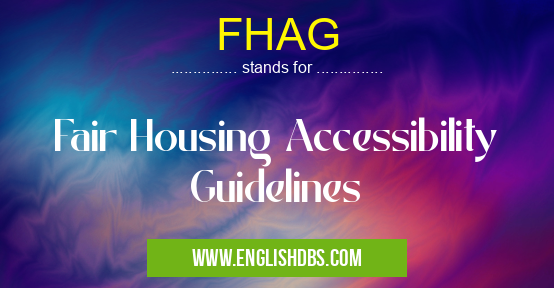What does FHAG mean in HOUSING & AMENITIES
FHAG (Fair Housing Accessibility Guidelines) is a set of standards established by the United States Department of Housing and Urban Development (HUD) to ensure that housing is accessible to people with disabilities. These guidelines provide technical specifications for the design and construction of accessible housing, including requirements for wheelchair ramps, accessible bathrooms, and other features that enable people with disabilities to live independently.

FHAG meaning in Housing & Amenities in Community
FHAG mostly used in an acronym Housing & Amenities in Category Community that means Fair Housing Accessibility Guidelines
Shorthand: FHAG,
Full Form: Fair Housing Accessibility Guidelines
For more information of "Fair Housing Accessibility Guidelines", see the section below.
FHAG in Architectural Design
FHAG plays a crucial role in architectural design, ensuring that buildings are compliant with accessibility regulations. By incorporating FHAG guidelines into their designs, architects can create living spaces that are equitable and inclusive for all residents, regardless of their physical abilities.
Key Aspects of FHAG
- Accessibility: FHAG focuses on providing accessible features that allow people with disabilities to navigate and use housing comfortably.
- Usability: The guidelines emphasize the importance of usability, ensuring that accessible features are practical and user-friendly.
- Universal Design: FHAG promotes universal design principles, aimed at creating spaces that can be used by everyone, regardless of their abilities.
Essential Questions and Answers on Fair Housing Accessibility Guidelines in "COMMUNITY»HOUSING"
What are the Fair Housing Accessibility Guidelines (FHAG)?
The FHAG are federal accessibility regulations that ensure equal access to housing for people with disabilities. They provide minimum standards for the design, construction, and alteration of multifamily housing and public and commercial facilities.
Who is required to follow the FHAG?
The FHAG apply to all multifamily housing with more than four units, as well as public and commercial facilities. Specifically, they apply to:
- New construction
- Alterations or additions
- Structural repairs
- Common areas and facilities
- Public transportation facilities
What specific requirements do the FHAG cover?
The FHAG cover a wide range of accessibility features, including:
- Accessible entrances and exits
- Accessible routes of travel
- Accessible bathrooms and kitchens
- Accessible parking spaces
- Assistive listening systems
- Visual alarms
- Tactile signage
What are the benefits of complying with the FHAG?
Complying with the FHAG provides several benefits, including:
- Ensuring equal access to housing for people with disabilities
- Reducing the risk of discrimination lawsuits
- Improving the marketability and value of properties
- Demonstrating a commitment to inclusivity and diversity
How can I get more information about the FHAG?
You can find more information about the FHAG on the website of the U.S. Department of Housing and Urban Development (HUD): https://www.hud.gov/program_offices/fair_housing_equal_opp/fh_standards
Final Words: FHAG is an essential framework for accessible housing design, ensuring that individuals with disabilities have equal opportunities to live in safe, comfortable, and accessible homes. By adhering to FHAG guidelines, architects, builders, and developers can contribute to a more inclusive and equitable society where everyone can thrive in their living environments.
